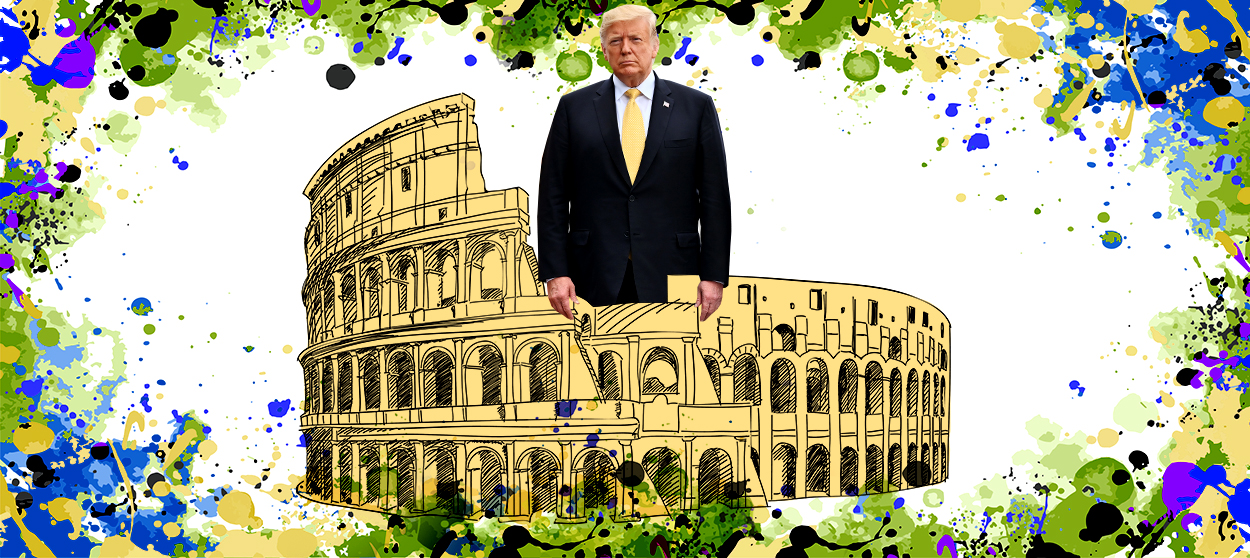America is an empire, not a nation
Why Trump shouldn't be lumped in with far-right nationalists in Europe


A free daily email with the biggest news stories of the day – and the best features from TheWeek.com
You are now subscribed
Your newsletter sign-up was successful
Every time some tinpot nationalist Euro-huckster wins a meaningless election — a local council seat or control of a given country's delegation in the European Parliament — we are told that we are witnessing the rise of a movement. This Nationalist International is, we are told, both dangerous and unstoppable. The latter at any rate looks increasingly true.
Where students of the new nationalism err, I think, is lumping Matteo Salvini and Marine le Pen and Nigel Farage in with Donald Trump. There are, one admits, certain incidental similarities between the leaders of the European far right and our president. But these are mostly confined to such questions as who are their mutual enemies — i.e., the cultural and social elite of their respective countries — and in some cases with rhetorical style. What all the former have in common is something that Trump utterly lacks: that is, a political program that could accurately be described as nationalist.
There is a vast amount of commentary on the subject of so-called American nationalism, both pro and contra. But both sides are begging the question by debating the merits of a concept they have willed into existence together.
The Week
Escape your echo chamber. Get the facts behind the news, plus analysis from multiple perspectives.

Sign up for The Week's Free Newsletters
From our morning news briefing to a weekly Good News Newsletter, get the best of The Week delivered directly to your inbox.
From our morning news briefing to a weekly Good News Newsletter, get the best of The Week delivered directly to your inbox.
First we must decide whether America is in any sense a nation. If by "nation" one simply means a sovereign state — in the sense of the "League of Nations" — then we are more or less that. (The question of whether global capitalism does not possess a sovereignty of its own that supersedes that of countries is an interesting one, but not one I shall attempt to answer here.) But if one means that there is an "American nation" in the same sense in which there is a French or an Italian one, I am afraid the answer is that there is no such thing, nor will there ever be one.
The United States is not what the New Oxford American Dictionary defines as "a large aggregate of people united by common descent, history, culture, or language, inhabiting a particular country or territory." We have no language of our own, though it is mostly thanks to our power and influence that English has become a lingua franca. We have no national literature that compares to that of France or England but rather a succession of regional literatures that have all been displaced first by Hollywood, then by the internet. We have invented various art forms — popular music, the cinema — that have transcended our borders. We have no national cuisine, no folk art, no customs that transcend racial and regional divisions that in some date beyond 1776. Practically the only worthwhile things that were and have remained more or less uniquely and indubitably American are jazz and college football.
It is even more difficult to talk in a general manner about the American people and their character. What is a prototypical American? We look past the banalities of late capitalist technocracy to the hard men and women who lived through the Depression and then a World War, to the pamphleteering reformers and grim industrialists of the Gilded Age, to the new men of the Midwest who destroyed the tyranny of the Southern cavaliers, to the coonskin lawyers and whiskey surveyors in the age of Jackson, to the granite-faced Puritans, all the way back to the vast empire of the mound builders and find — what? Which are the virtues common to Davy Crockett, William T. Sherman, Sitting Bull, Louis Armstrong, and Dick Butkus?
If America is not a nation, it follows, surely, that we cannot have nationalistic feelings about her unless we use the latter in the vague sense recommended by George Orwell, who thought it really meant fideistic devotion to any cause larger than oneself. As it happens I do think that there is an identifiable spirit that animates American patriotism. It is not romantic but classical, like the columns of the Lincoln Memorial. This is another way of saying that it is imperial.
A free daily email with the biggest news stories of the day – and the best features from TheWeek.com
America is not a nation but an empire. She has been one at least since 1945, if not since the end of the Civil War. It is the inability to acknowledge or even to recognize this fact that inspires most of the so-called new nationalists in this country — I am thinking mostly of conservatives like F.H. Buckley, R.R. Reno, and J.D. Vance — when they go wrong. Practically speaking, their instincts are sound. These and other writers and thinkers have attempted to create a new vision of American conservatism, one that defines itself against atomistic individualism, against the power of global capital, and against various GOP talking points about political economy.
So far so good. Where the nationalists go wrong, as they do on the subject of immigration, it is because they are clinging to myths about an American nation instead of admitting the reality of American empire.
It is no use denying that millions of people in Latin America would like to come to this country. This is inevitable. Never before in the history of the world have standards of living varied so widely across one easily scalable landmass. This would not be a problem if we took the Monroe Doctrine to its logical conclusion. The drug lords of Central and South America are our problem and our responsibility every bit as much as the barbarians of Gaul were Rome's. The correct response to violence on the American continent is not, as the liberals would have it, accepting an unlimited number of refugees in the imperial capital or the stolid indifference recommended by the nationalists but a campaign of liberation that extends from Argentina to, if necessary, Greenland.
Likewise, it is no use arguing that those immigrants whom we do welcome to this country are under any obligation to "assimiliate," whatever that might mean in an American context. The idea of my becoming, say, Icelandic will strike anyone as absurd in a sense that the opposite case — a man emigrating from Iceland and sooner or later becoming an American — does not. This is because Americans are, by definition, cosmopolitans, citizens of the world like Alexander the Great:
[Alexander] did not, as Aristotle advised him, rule the Grecians like a moderate prince and insult over the barbarians like an absolute tyrant; nor did he take particular care of the first as his friends and domestics, and scorn the latter as mere brutes and vegetables; which would have filled his empire with fugitive incendiaries and perfidious tumults. But believing himself sent from Heaven as the common moderator and arbiter of all nations, and subduing those by force whom he could not associate to himself by fair offers, he labored thus, that he might bring all regions, far and near, under the same dominion. And then, as in a festival goblet, mixing lives, manners, customs, wedlock, all together, he ordained that every one should take the whole habitable world for his country, of which his camp and army should be the chief metropolis and garrison; that his friends and kindred should be the good and virtuous, and that the vicious only should be accounted foreigners.
This is the mantle we have inherited. By comparison the atavistic zeal of an ex-commodities trader on an increasingly insignificant island in the North Atlantic seems like a small and even a contemptible thing. That's because it is.
Matthew Walther is a national correspondent at The Week. His work has also appeared in First Things, The Spectator of London, The Catholic Herald, National Review, and other publications. He is currently writing a biography of the Rev. Montague Summers. He is also a Robert Novak Journalism Fellow.
-
 The week’s best photos
The week’s best photosIn Pictures An explosive meal, a carnival of joy, and more
-
 The ‘ravenous’ demand for Cornish minerals
The ‘ravenous’ demand for Cornish mineralsUnder the Radar Growing need for critical minerals to power tech has intensified ‘appetite’ for lithium, which could be a ‘huge boon’ for local economy
-
 Why are election experts taking Trump’s midterm threats seriously?
Why are election experts taking Trump’s midterm threats seriously?IN THE SPOTLIGHT As the president muses about polling place deployments and a centralized electoral system aimed at one-party control, lawmakers are taking this administration at its word
-
 ‘The forces he united still shape the Democratic Party’
‘The forces he united still shape the Democratic Party’Instant Opinion Opinion, comment and editorials of the day
-
 ‘Those rights don’t exist to protect criminals’
‘Those rights don’t exist to protect criminals’Instant Opinion Opinion, comment and editorials of the day
-
 ‘The mark’s significance is psychological, if that’
‘The mark’s significance is psychological, if that’Instant Opinion Opinion, comment and editorials of the day
-
 ‘The West needs people’
‘The West needs people’Instant Opinion Opinion, comment and editorials of the day
-
 ‘The censorious effect is the same, even if deployed covertly’
‘The censorious effect is the same, even if deployed covertly’Instant Opinion Opinion, comment and editorials of the day
-
 Vietnam’s ‘balancing act’ with the US, China and Europe
Vietnam’s ‘balancing act’ with the US, China and EuropeIn the Spotlight Despite decades of ‘steadily improving relations’, Hanoi is still ‘deeply suspicious’ of the US as it tries to ‘diversify’ its options
-
 ‘The sport is still run on a shoestring’
‘The sport is still run on a shoestring’Instant Opinion Opinion, comment and editorials of the day
-
 ‘We know how to make our educational system world-class again’
‘We know how to make our educational system world-class again’Instant Opinion Opinion, comment and editorials of the day
